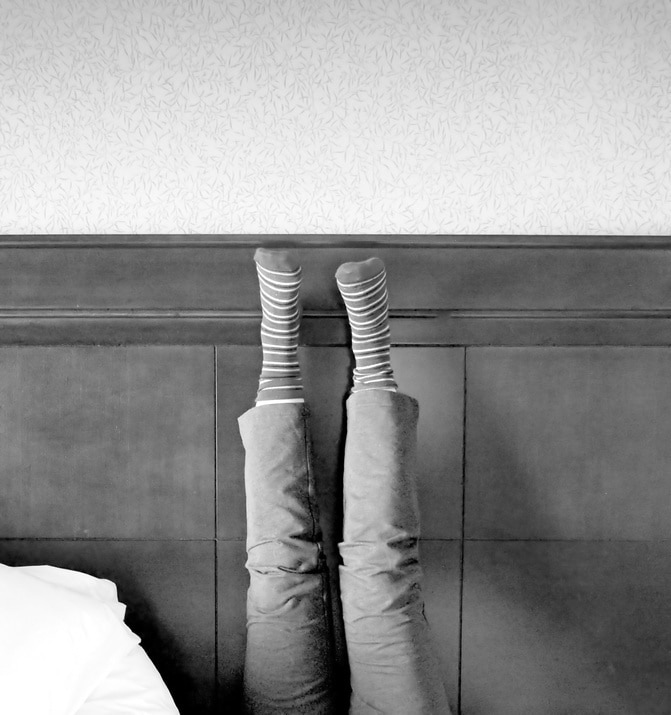Common Symptoms of CVI – Should you be concerned?

The concern about having or developing Chronic Venous Insufficiency (CVI) is a great reason to have your varicose veins fully assessed by a qualified Vein Specialist.
Why should I be concerned about the symptoms of Chronic Veins Insufficiency?
Chronic Venous Insufficiency, also known as Venous Reflux Disease or Venous Stasis, refers to a condition of inadequate blood flow from the legs back to the heart. In healthy veins, blood pressure and muscle movement move blood out of the legs and upwards; one-way valves prevent back-flow of blood between heart beats. When those valves become weak, veins become distended and blood pools in the lower legs. This can lead to Chronic Venous Insufficiency. While CVI is not usually lethal, its symptoms can significantly diminish your quality of life.
What are the most common symptoms of Chronic Venous Insufficiency?
If you experience any of these symptoms, consider getting a full vascular health evaluation from a qualified Vein Specialist to determine what can be done to improve your quality of life.
- Varicose and spider veins
- Swelling of the legs and ankles
- Skin color changes over the legs and ankles
- Sores on the legs (ulcers), especially those that are slow to heal
- Aching legs
- Heavy legs
- Burning, throbbing in the legs
- Muscle cramps
- Leg fatigue
- Bleeding veins
- Itching over veins
- Restless legs
- Leg pain after sitting or standing long periods
Who is at risk of developing the symptoms of Chronic Venous Insufficiency?
There are a number of reasons that venous valves become weaker, and family history tops the list. If other members of your family have CVI, you have a much higher chance of developing this condition. Other factors include:
- Age. Vessel walls get weaker over time.
- Hormonal factors. Hormonal imbalances and fluctuations affect vessel wall integrity.
- Pregnancy. Hormonal fluctuations and the physical pressures of pregnancy are both factors.
- Trauma and other injury to the legs. Scar tissue can also impair blood flow.
- Deep Vein Thrombosis. These are clots that form in the deep venous system and impede blood flow.
There are lifestyle factors, as well, that can increase your chances of developing CVI. Any repeated activity (or inactivity) that impedes or slows blood movement in the body will impair your vascular health, including:
- Standing or sitting for long periods. Gravity can take a toll, and blood moves better when the body is moving.
- Obesity. It takes a lot of physical resources to support increased fat tissue.
- Smoking. Not only does smoking decrease the amount of oxygen that is taken in by the body, its long-term effects include a buildup of plaque and decreased flexibility in the vessel walls.
- Hypertension. High blood pressure can also contribute to a decrease in blood vessel wall flexibility.
- Lack of physical activity. Blood moves better when the body is moving.
Treatment for the symptoms
While there is no cure, there are a number of minimally invasive procedures available that will improve vascular sufficiency, and provide relief from CVI symptoms. Read more about them by clicking on the links.
- Medical Adhesive (Veneseal Closure System)
- Laser Treatment (Endovenous Laser Treatment (EVLT)
- Radio Frequency Ablation (ClosureFast Radiofrequency Procedure)
- Liquid Sclerotherapy and Compression (chemical injection)
A board certified Vein Specialist can provide you with a full vascular exam and Duplex Ultrasound.These tools will measure the blood flow returning to the heart, assess your overall vein health, and allow for the creation of a treatment plan tailored to your specific needs.
Leg Cramps There are many reasons for muscle cramps. A lot of people experience them because of a deficiency of certain key elements such as potassium and magnesium. Others, particularly those that live in warmer climates such as Arizona, experience cramps due to dehydration. A large number of patients I consult, flat out do not…
Read MorePregunta: yo tenía EVLT por otro doctor de la vena y resolvió la mayor parte de mi dolor. Cuatro semanas después de que tuve escleroterapia con espuma, mi dolor regresó. En realidad, ha empeorado. Un mes post, me pongo 30-40 mm medias diarias, pero aún así me duele mucho. Veo a mi médico en un…
Read MorePregunta: el calcetín de compresión de rodilla alta está pellizcando la parte superior de mi rodilla y dejando marcas doloridas (muescas). Mi trabajo requiere que me quede todo el día. Tengo venas de araña en mis tobillos y en el costado de mi pantorrilla exterior. ¿Debo seguir gastando la media aunque sea incómodo?
Read MoreQuestion: I had EVLT by another vein doctor and it resolved most of my pain. Four weeks after I had foam sclerotherapy, my pain returned. Actually, it has worsened. One month post, I wear 30-40 mm stockings daily, but still I hurt SO much. I see my doctor in a month, any thoughts about what…
Read MoreQuestion: The knee-high compression sock is pinching the top of my knee and leaving sore marks (indentations). My job requires me to stand all day. I have spider veins in my ankles and on the side of my outer calf. Should I continue to wear the stocking even though it’s uncomfortable?
Read MoreQuestion: I went to a doctor in Glendale and finished all my Sclerotherapy injections and have had 2 EVLT (endovenous laser therapy) procedures, a vein ligation and a microphlebectomy for spider veins, all of which I wore 20-30 mmHg compression thigh-high hose for 2-3 weeks. After I had laser treatments on my legs, I was…
Read MoreQuestion: I live in Tucson, Arizona and had VenaSeal done by a doctor here. Should I have pain and swelling after my VenaSeal procedure was carried out? It was purported to be painless compared to radiofrequency ablation (RFA).
Read MoreQuestion: I don’t know who to turn to. I take Furosemide and it doesn’t seem to be helping as fast as it should be. Do I need to see a podiatrist or do I need to get a referral to go see a specialist? I’ve been off work for 2 and 1/2 months from total…
Read MoreQuestion: My wife has had multiple ultrasounds. One ultrasound tech found a bad perforator at 5mm, but they wanted to do open surgery. Another ultrasound tech from the Dr she wanted to use who does laser and RF could not find the perforator. What to do?
Read MoreCabbage not always an “Irish” food, but beneficial for varicose veins Whether you’re one of the 34.5 million Americans who claim Irish ancestry or not, celebrating Saint Patrick’s Day has some potential health benefits! When the Irish immigrated to the United States, they found beef brisket was inexpensive, and nutrient dense cabbage was affordable and…
Read More

